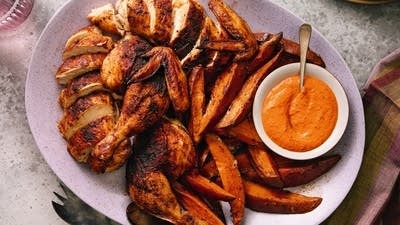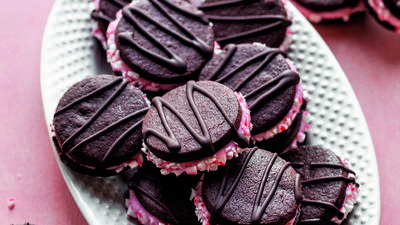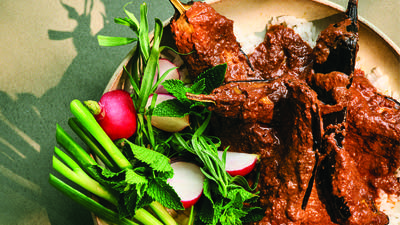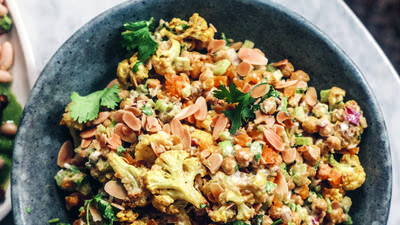
Cecile Richards is one of the most powerful, accomplished, activist leaders of her generation. She helped her mother, Ann, get elected governor of Texas, she was a labor organizer for migrant women, and she was the president of Planned Parenthood for over a decade. She’s also a serious cook and baker with an intense passion for pies and Southern food. Richards talked with Francis Lam about the ways in which food bridges the divide we often feel in politics, and passed down to Francis three essential skills in cooking. Cecile Richards’s book is Make Trouble: Standing Up, Speaking Out and Finding the Courage to Lead. And if, after listening to the interview, you feel an urge to start baking some pies, we’ve put together a list of some of our favorite recipes.
Francis Lam: I'd love to start with the author bio on the cover of your book, because I'm reading it and the last line of it is, 'she spends most of her free time baking pies.’ I was struck by it because it brought to my mind all these moments from the past where I've remembered powerful feminist leaders seeming like they felt like they need to distance themselves from quote-unquote domestic things like cooking. What has changed that leads you to think the third thing you want people to know about Cecile Richards is that you’re a hell of a pie baker?
Cecile Richards: Well, I wish I'd given it that much intentional thought, and it probably just says that I don't have a lot of hobbies. Pie baking as a default became something that I love to do, my kids love to do, and I think the older you get, the more you like to find things that you share with your children. We have an annual Thanksgiving pie bake-off. But, I also I grew up in Texas, and it's a place where food and having people over and cooking together was just such a big part of my upbringing. That was the culture there. It's very different from New York City, where I live now, where it does seem like most people use their stove as a place to store extra shoes they didn't have room for in their closet. So, it's funny, I feel like it's one of those things I've carried with me no matter where I've lived, this love of cooking and entertaining. It wasn't until I came to New York City that I realized people actually had other people come and cook in their apartments when they had dinner parties. I still haven't gotten over that, sorry.
FL: I mean, it is weird.
CR: It's very weird, and that no one helps you do the dishes in New York because I guess they don't do them.
FL: It's not even built into the polite culture. It's like, “What are dishes? Don't they just disappear? Don't they go back in the rack and get rolled away?”
CR: Exactly.
 Cecile Richards
Photo: Planned Parenthood Federation of America
Cecile Richards
Photo: Planned Parenthood Federation of America
FL: But, you didn't get into baking pies growing up at home, right? You learned to bake pies while you were organizing workers in a small town in Texas. Tell me about that.
CR: I became an organizer. I started organizing garment workers right out of college. These were women who earned minimum wage working along the Rio Grande border. They didn't have any money. I didn't have any money. This was really grassroots-y work which I've done most of my life, and so, cooking was one of those things that you could do and have people over. I think it was a way of making friends and building community. One of the places I lived was Tyler, Texas, which is in deep East Texas. It's more like the South than it is really the Southwest. One of the most amazing pie places I ever had been was Cox's Grill, where you could get pie for breakfast, which I just thought was the most amazing discovery. It wasn't even that the pie was great but it was plentiful, and it was just something people did. So, I got hooked.
FL: Let's talk about pie for a minute, like literal pie. Butter, shortening or lard?
CR: Listen, I'm sure I'm going to break a lot of hearts out there, but I am an all-butter woman – and I've tried it all.
FL: Another butter person. I love lard, and shortening is fine – I mean, it's lard-ish – but butter's great because it has a little bit of that water content, so when it bakes, it actually steams and puffs a little bit.
CR: Yeah, I'm kind of glad butter's back.
FL: But then filling. Are you a fruit gal or are you a custard gal?
CR: I'm a big fruit pie person, but I like a good lemon meringue. I'm a big pecan pie person. I spent many years in New Orleans and I basically can cook almost anything that you can eat in New Orleans – and would for the rest of my life. If I were on a desert island and could only have one meal, it would definitely be a big New Orleans feast. I especially like cherry pie. Also, who doesn't like pie? I'm sure there is someone. I may have even met someone and they just didn't have the heart to tell me, but I feel like it's just one of these great bonds you can make across, I don't know, across the aisle, perhaps. I haven't really tried that yet, though.
FL: At your next congressional hearing?
CR: Before I start, maybe everyone would like a little bit of this cherry pie.
FL: Right now, we are in an intense moment, maybe an existential moment, in our politics. You are obviously very busy because of that. This is a weird question to be asked, because we asked you onto our food show, but does it feel trivial, in this moment, to be talking about baking pies?
CR: We're all human beings. We have to live through this period, and I actually think it's really important that we retain our humanity now. One of the things that has been interesting to me – and I feel like people are recognizing that – is that at a moment in which the message out of some politicians is so divisive, they speak about fellow human beings in ways that dismiss their very existence or their right to exist, I think it's really important that we have other things that can begin to bring us together. One of the things I have felt so strongly about and why I'm traveling around the country now talking to women is I think we haven't been listening to each other very much. I think a lot of politicians are telling us what we should believe, they're not really listening to people. Cooking meals, eating, sharing food, is something that is so basic to our humanity, and I think folks are retreating to some of these tried and true methods of being people together. So, I love it; I think it's important. Probably the most special times of my lifetime are ones where I remember being around the table with family or friends, cooking and enjoying food together. There's something that is just a common thread that runs through all of us.
 Make Trouble
by Cecile Richards
Make Trouble
by Cecile Richards
FL: Yeah. I think eating with people is powerful emotionally, but I also think there's something particularly special about feeding someone. I'm a semi-new dad. We don't go out. We're at home. So, I've been cooking so much more daily food instead of cool project food. What I've begun to feel in such a powerful way is that I've never felt important in my entire life until I started feeding my daughter. Knowing the act of my cooking this food, putting it in front of her, and watching her spoon it into her mouth, that's keeping her alive right now. There's something so profoundly human and humane about that experience of cooking for people.
CR: Right. It’s so satisfying. One of the things that I do with my kids and my husband is every year we try to go someplace we've never been. Last Christmas, we went to India for the first time because we've been trying to wait until we had enough time to spend a couple weeks. We went to Amritsar, it's on the border, and went to the Golden Temple. A friend of mine, her family is from there, and we went and served at the Golden Temple kitchen, which is this free kitchen where they serve thousands and thousands of people every day. It's almost completely volunteer-run; you basically can just show up. So, we did, and of course no one there really spoke English, and we didn't speak any Hindu and any languages that were being spoken. I remember sitting next to some women who had traveled for two days to get there from all across India in order to serve. We sat there and we rolled roti, and we served people, and it was absolutely bar none the most incredible experience my kids have ever had in all of our trips. It felt like we were in this community, and people welcomed us, and they just made a place for us. It's something I'll never forget, but it speaks to what you're saying, this basic act of feeding others and being in service to others through food is really, there's nothing quite like it.
There’s one thing I should tell you since you're a new dad. This is just one of my rules. I said this before my kids left home and went away to college. There were three things they had to know how to do. One, deep fry, because it's a dying art, I think, for us Southerners. They absolutely had to know how to make a good pie crust, which they're all more than capable of doing. And third, be able to fry a tortilla into a good chalupa because that's another thing that too few people in America really understand.
FL: I love that of the three things you made sure the kids knew, two of them were deep-fry related.
CR: You'd be surprised how many people you meet in New York who don't know anything about deep frying. It's a crime.
FL: No, this is a legit thing because I never deep fry at home.
CR: Just invite me over, I think I could give you some tips.
Before you go...
Each week, The Splendid Table brings you stories that expand your world view, inspire you to try something new, and show how food connects us all. We rely on your generous support. For as little as $5 a month, you can have a lasting impact on The Splendid Table. And, when you donate, you’ll join a community of like-minded individuals who love good food, good conversation, and kitchen companionship. Show your love for The Splendid Table with a gift today.
Thank you for your support.
Donate today for as little as $5.00 a month. Your gift only takes a few minutes and has a lasting impact on The Splendid Table and you'll be welcomed into The Splendid Table Co-op.




